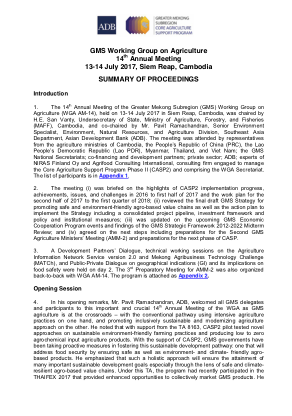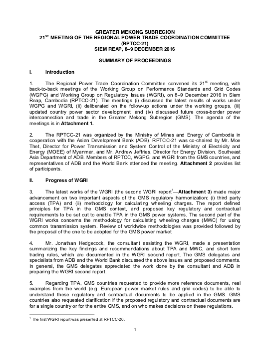Twenty-Second Meeting of the GMS Subregional Transport Forum
The Twenty-Second Meeting of the GMS Subregional Transport Forum (STF-22) was held in Mandalay, Myanmar on 21–22 June 2018.
The Twenty-Second Meeting of the GMS Subregional Transport Forum (STF-22) was held in Mandalay, Myanmar on 21–22 June 2018.
A pilot project is introducing the use of barcodes to track the quality and safety of food in the Greater Mekong Subregion from “farm to shelf, then table.”
The Greater Mekong Subregion Tourism Working Group held its 41st meeting in Nakhon Phanom, Thailand on 25 June 2018, back-to-back with the Mekong Tourism Forum 2018 on 26–29 June.

The Greater Mekong Subregion Working Group on Agriculture held its 15th meeting on 29–30 May 2018 in Pu’er, Yunnan Province in the People’s Republic of China.
Disruptive technologies, such as Internet of Things and artificial intelligence, have the potential to bring about rapid, self-sustained economic growth for countries in the Greater Mekong Subregion.
Foreign ministers from Japan and five Mekong nations this month identified areas of cooperation under a new strategy and reviewed the progress of joint projects in the East-West Economic Corridor and Southern Economic Corridor.
Economic zones are growth engines of the Greater Mekong Subregion, stimulating economic activity and creating jobs. Yet, not much attention has been given to the social and health aspects of economic zone development until recently.

This is the summary of proceedings from the 24th Meeting of the Regional Power Trade Coordination Committee (RPTCC-24) on 18 to 20 June 2018 in Nay Pyi Taw, Myanmar.
Countries in the Greater Mekong Subregion recognize how a health impact assessment framework can help ensure that both businesses and communities benefit from economic zone development.
The Mekong Innovative Startups in Tourism (MIST) announced the 10 companies it will support in 2018 under its Startup Accelerator Program and Market Access Program.